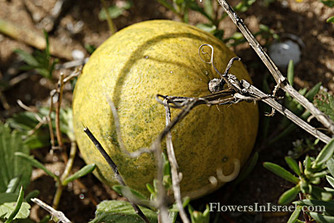 When Elisha returned to Gilgal, there was famine in the land. As the company of prophets was sitting before him, he said to his servant, "Put the large pot on, and make some stew for the company of prophets." One went out into the field to gather oroth and found a wild vine and gathered from it his lap full of wild gourds and came and cut them up into the pot of pottage, not knowing what they were. The stew was poured out for the men, but as they began to eat it, they cried out, "Man of God, there is death in the pot!" And they could not eat it. 2 Kings 4:38–40 The biblical oroth is garden rocket, an annual in the mustard family. Rocket, Erica sativa, flourishes in the hilly areas of Israel and throughout the Mediterranean. Also native to the salad aisle in the supermarket, we may know it as arugula. Buds, flowers and leaves were used as potherbs by pastoralist communities in ancient Israel. As with rocket, greens such as dandelion, wild carrot, dock, purslane and sorrel provided forage for flocks and herds, and were gathered for “pottage” (vegetable stews). Something, however, is clearly amiss in the vegetable stew at Elisha’s hearth; the “death in the pot” was likely the wild gourd, Citrullus colocynthis, or bitter apple. A member of the watermelon family, it’s a ground-hugging vine which grows abundantly in dry conditions and bears round, yellow fruit with green spots and poisonous pulp. When consumed, it can be a violently purgative agent. Foraging for wild vegetables is a basic survival skill that has long been forgotten in this age of large scale agriculture. Now that our modern diet relies on white bread, burgers and other processed foods, these wild potherbs, once relished, are marginalized. We view them as weeds, because they are hardy and tenacious, growing along roadsides and popping up in lawns. But edible wild plants added robust flavor and valuable nutrients to the biblical diet. A source of vitamins A and C, rich in calcium, iron and potassium, they can be found in the Biblical Garden. Elisha’s stewpot reminds us that it’s best to know what’s in our salad and our pottage before we eat it, as his company of prophets regrettably discovered. |
AuthorsMichael Schlesinger is Temple Sinai’s Biblical Gardener. Mike has been gardening since he was eight years old. He used to grow grape vines and make wine when he lived in California. He now tends to our garden, continuing the traditions started by Catherine Walters. Archives
March 2020
|

Affiliated with the Union for Reform Judaism
30 Hagen Avenue • Cranston, RI 02920 • 401-942-8350 Office: dottie@templesinairi.org Rabbi Jeffrey Goldwasser: [email protected] |
Want to sign up for the weekly Sinai Scroll email?
Click here to receive weekly updates on Temple services, events and a message from the Rabbi. |


